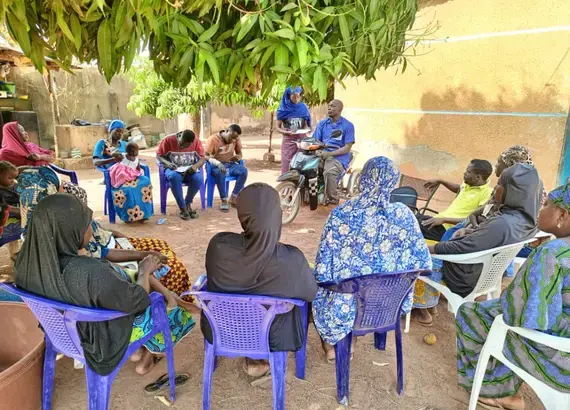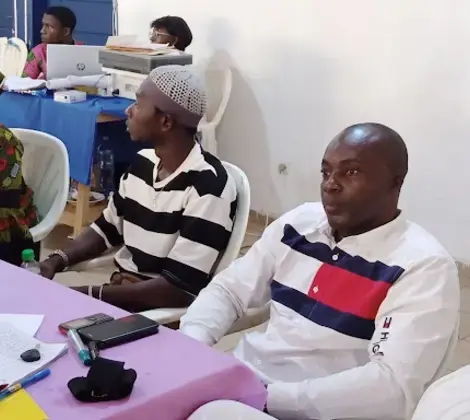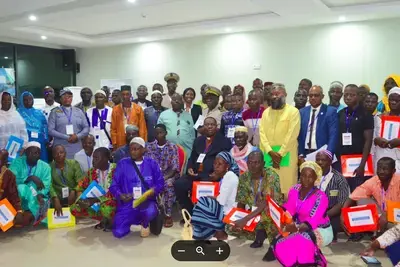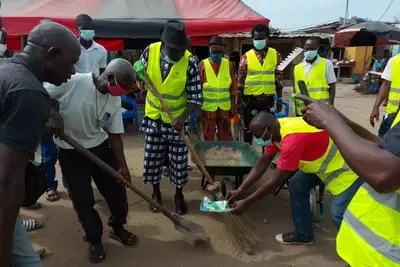
Neighborhood-based discussion on preventing violent extremism in Tengrela on February 13, 2023
Success Story
Combating Stigma and Fostering Unity in Côte d’Ivoire: Marius’ Story
On a warm day in February, a group of mostly young mothers and young men took a break from their day to meet up in a courtyard in their neighborhood in Tengrela, a city in northern Côte d’Ivoire. They were there to learn from Marius Traore Klowi, a community leader with a physical disability, about how their actions could help contribute to their community’s resilience against the possible infiltration attempts by violent extremist groups who are active across the border region with Mali. Marius, who also lives in Tengrela, explained how they could contribute to countering some of the risks that their city might face by remaining observant, reporting suspicious behavior, and promoting inclusion and social cohesion with all ethnic groups in the area to minimize the feelings of marginalization and grievances that extremists often exploit. He then facilitated a discussion about what risks the participants could already see in their neighborhood.
Marius was trained to be a community discussion facilitator by the National Democratic Institute (NDI). He has worked tirelessly with NDI since 2019 to promote local-level social cohesion and reconciliation, prevent and counter violent extremism, and support the inclusion of women and youth in the country’s politics through the Political Transition and Inclusion Program (PTI) funded by the United States Agency for International Development (USAID).
Marius also chairs the committee to implement the local community solidarity plan (PSC) for Tengrela, which he and other community leaders and members developed to identify ways to promote better relations among the different ethnic groups in the city. Since its creation in December 2019, the committee has orchestrated a series of workshops, placing the core focus on fortifying community solidarity. Nestled in the remote northern reaches of the Ivory Coast, near the Malian border, Tengrela played host to a dynamic dialogue among farmers, herders, and traditional chiefs. On that occasion, farming and herding communities – which are traditionally isolated from one another – came together to discuss and resolve shared issues of concern. Traditional chiefs contributed by sharing time-honored dispute resolution methods, sparking a collective brainstorming session aimed at finding sustainable solutions.

Marius, center right, participates in a workshop to share lessons learned from his community volunteering experiences.
Throughout his time working with NDI, Marius has seen that when tensions are managed constructively through dialogue, conflict is preventable. Among his most proud achievements was helping to resolve a dispute between a farmer and a herder, which is a common source of conflict in the region that can sometimes lead to violence along ethnic divides. “A farmer found his sorghum field destroyed by cattle and immediately went on the offensive against the owner of the nearest cattle yard. A bystander alerted me in my quality as PSC President… After I talked with [the farmer], he followed my advice to let the PSC intervene. So I convened a PSC meeting, and after the issue was investigated by members of the committee, it was decided that the owner of the cattle was in the wrong, and the latter paid damages to the farmer.”
As PSC chairman and NDI facilitator, Marius has learned to keep his composure and peacefully resolve disputes.
As a local leader and person with a physical disability, Marius is also helping to combat attitudinal barriers experienced by people with disabilities in his community. Stigma and stereotypes, including the belief that persons with disabilities are incapable of contributing to society, continue to present significant barriers to persons with disabilities exercising their rights and participating politically. Leaders within the disability community, such as Marius, contribute to challenging these negative assumptions by raising the positive visibility of people with disabilities as equal contributing members of society. Mainstreaming people with disabilities into traditional political activities, such as organizing and issue advocacy, is also critical to ensure people with disabilities are able to exercise their rights on an equal basis as others.
Today, Marius is a highly visible figure within the community and credits NDI for supporting his leadership development. “Since my engagement in NDI activities, I feel very respected and appreciated. I earned this esteem from the authorities because I’m always keen to contribute to the community by setting a good example.” Marius’ leadership and involvement in community initiatives have led him to build and sustain positive relationships with regional authorities, as well as religious and community leaders, which has enabled him to successfully address community issues. These relationships also contribute toward promoting local-level social cohesion and reconciliation and ensuring effective inclusion of traditionally marginalized groups.
NDI’s engagement with this program is implemented with support from the United States Agency for International Development (USAID).


